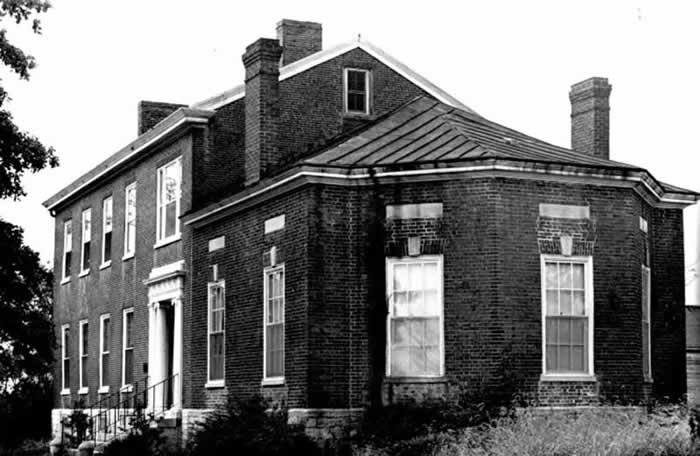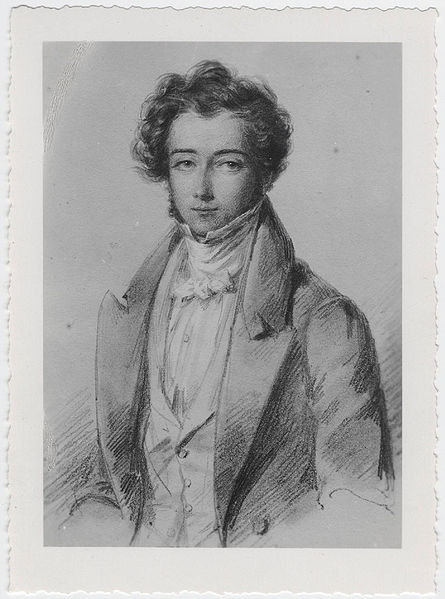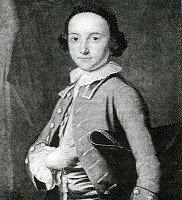 |
| Chaumiere’s “octagon room” asserted to have been built for Gen’l Lafayette, who never visited Photo: Jess. Historical Society |
 |
| Alexis de Tocqueville |
On Dec. 5, 1831, the Ohio River froze over, making voyage impassable for Alexis de Tocqueville and his party. They disembarked at Westport, Oldham Co., Ky. and walked the cold 22 miles to Louisville. It was one of many poor experiences that during a 10-month voyage planned to determine “what a great republic is like.”
Upon reaching Louisville, the river still offered no passage and de Tocqueville experienced a large swatch of central Kentucky as he traveled south toward Nashville. His writings on Kentucky were not kind:
“Nothing in Kentucky … gives the impression of such a finished society.”
Kentuckians “are well known through the union for their violent habits.” “They seem to deserve that reputation.”
Ouch.
Though unimpressed with Kentucky, de Tocqueville extolled the United States in his great work, Democracy in America. In this magnum opus, he warned that “when the past no longer illuminates the future, the spirit walks in darkness.”
To avoid such darkness, we should take occasion to examine our history. A great starting point in the history of Jessamine County is the grand country estate of Colonel David Meade: Chaumiere des Praries.
 |
| A young David Meade Photo: Rootsweb |
Colonel Meade was born in Virginia, schooled in England and married a young girl from Williamsburg, Va.
He served in the House of Burgesses which was dissolved by Lord Botetourt, the then-governor of colonial Virginia. He would not again hold public office. Instead Colonel Meade acquired a significant estate on the James River. It is said that here “he practiced the fine art of landscape architecture and hospitality, and often entertained the leaders of Virginia.”
In 1796, however, Meade departed Virginia for the wilderness of Kentucky.
The year before, he had purchased about 300 acres in what is now Jessamine County. Once here, he would master that fine art of landscape architecture with his Chaumiere des Praries.
Of Chaumiere’s landscape, Meade’s granddaughter wrote: “The grounds were extensive and beautiful; at that time it was said there was not so highly and tastefully improved country seat in America. … And then the walks — the serpentine one mile around … and in a secluded nook, a tasteful Chinese pavilion. The birdcage walk was cut through a dense plum thicket, excluding the sun, and led to a dell, where was a large spring of water, and the mouth of a cave.
At this point was the terminus of the lake, and … a waterfall.”
His house guests were both frequent and notable: James Monroe, Andrew Jackson, General Charles Scott, and Zachary Taylor were all guests. Statesman Henry Clay and Transylvania University president Dr. Horace Holley were both known to regularly travel 9 miles from Lexington to the house and gardens at what is now Catnip Hill Road.
Nothing but glowing remarks of Col. Meade’s hospitality, his home, and the grounds of Chaumiere have been written. Dr. Holley wrote that “there is no establishment like this in our country.”
Chaumiere des Praries was a site to behold. Meade died in 1832 (the year after de Tocqueville traversed Kentucky); the estate sold in 1835 to a “plain practical farmer” who quickly turned the Colonel’s gardens into grazing pastures. The farmer felled trees, destroyed the parks and drained the lakes.
Neighbors, incensed, decried the “Paradise Lost.”
But how different would de Tocqueville’s impressions of Kentucky have been had he feasted at Chaumiere and strolled its grounds?
This text for this post originally appeared in the Jessamine Journal. It should not be republished without permission.

